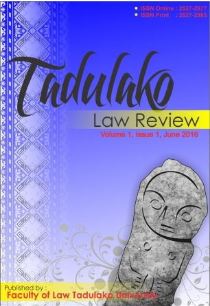FULFILLMENT OF THE RIGHTS OF PRE - POSTNATAL WOMEN PRISONERS IN WOMEN'S CORRECTIONAL INSTITUTION CLASS IIB YOGYAKARTA
Keywords:
Human Rights, Female Inmates, Correctional InstitutionsAbstract
Correctional institutions are places to organize correctional services for correctional inmates without forgetting the human rights of both male and female inmates. It is the nature of women to experience menstruation, pregnancy, childbirth, and breastfeeding that are not experienced by male inmates, so it is only natural that female inmates have special rights. This study will discuss the implementation of the fulfillment of the rights of female prisoners in the pre-postpartum period at the Yogyakarta Women's Correctional Institution and the obstacles in fulfilling the rights of female prisoners pre-postpartum at the Yogyakarta Women's Correctional Institution. The purpose of this study is to determine and analyze the implementation of existing regulations related to the rights of female prisoners at the Yogyakarta Women's Correctional Institution and the obstacles to their implementation. This type of research is normative-empirical with a qualitative descriptive method to find research knowledge that is carried out by processing field data and connecting it with relevant principles, theories, and legal regulations to produce conclusions. Three categories that can be taken in the discussion of the implementation of the fulfillment of the rights of pre-postpartum female prisoners in the Yogyakarta Women's Prison are: 1) rights that have been implemented well without notes; 2) rights that have been implemented well without notes; and 3) rights that have not been implemented well. In addition, limited funds, inconsistency in granting prisoners' rights, and the lack of interest of health workers with certain expertise to work in correctional Institutions are obstacles to fulfilling the rights of pre-postpartum female prisoners in the Yogyakarta Women's Prison.
References
Abdulkadir Muhammad. (2004). Hukum dan Penelitian Hukum. Bandung: PT Citra Aditya Bakti.
Firdaus Arifin. (2019). Hak Asasi Manusia: Teori Perkembangan dan Pengaturan. Yogyakarta: Thafa Media.
Maria S.W. Sumardjono. (2014). Bahan Kuliah Metodologi Penelitian Ilmu Hukum. Yogyakarta: Universitas Gadjah.
Poerwadarminta. (2001). Kamus Besar Bahasa Indonesia. Jakarta: Balai Pustaka.
Tim ICCE UIN Jakarta. (2003). Demokrasi, Hak Asasi Manusia, dan Masyarakat Madani. Jakarta: Prenada Media Group.
Journal Articles
Carolyn Sufrin, Alexa Kolbi-Molinas, dan Rachel Roth. (2015). "Reproductive Justice, Health Disparities and Incarcerated Women in the United States" Perspectives on Sexual and Reproductive Health. 47(4): 213-219.
Desy Kristiani Rahma Putri, Anak Agung Sagung Laksmi Dewi, dan Ni Made Puspasutari Ujianti. (2021). “Peran Lembaga Pemasyarakatan dalam Memenuhi Hak Narapidana Perempuan Hamil dan Pasca Melahirkan (Studi di Lembaga Pemasyarakatan Perempuan Kelas IIA Kerobokan)” Jurnal Interpretasi Hukum, 2(3): 550-554.
Duwita Aisya Trisna Prihananti. (2022). “Pemenuhan Hak Narapidana Hamil dan Menyusui di Lembaga Pemasyarakatan Perempuan” Indonesian Journal of Criminal Law and Criminology (IJCLC), 3(2): 68-78.
Elvi Alfian A. (2021). “Pembinaan terhadap Narapidana Wanita Hamil di Lembaga Pemasyarakatan Perempuan (LPP) Kelas II B Jambi” Jurnal Ilmiah Universitas Batanghari Jambi, 21(1):338-352.
Hanifah Mora Lubis dan Padmono Wibowo. (2021). “Tinjauan Hak-Hak Narapidana Perempuan di Lembaga Pemasyarakatan Kelas IIB Padangsidimpuan” Jurnal Syntax Transformation, 2(3): 307-323.
Nethan, Meylane Carmelia Manek, Agnellya Hendarmin Santoso, dan R. Rahaditya. (2023). “Over Kapasitas Dalam Lembaga Pemasyarakatan” Jurnal Kewarganegaraan, 7(2): 2217-2222.
Priscilla A. Ocen. (2012). "Punishing Pregnancy: Race, Incarceration, and the Shackling of Pregnant Prisoners" California Law Review, 100(5): 1239-1312.
Rebecca J. Shlafer, Jamie Stang, Danielle Dallaire, Catherine A. Forestell, dan Wendy Hellerstedt. (2017). “Best Practices for Nutrition Care of Pregnant Women in Prison” Journal Correct Health Care, 23(3): 297–304.
Somayeh Alirezaei dan Robab Latifnejad Latifnejad Roudsari. (2020). “Promoting Health Care for Pregnant Women in Prison: A Review of International Guidelines” Iranian Journal of Nursing and Midwifery Research, 25(2): 91-101.
Yasmine Fakhry. (2022). “A Review of Health and Nutrition in Prisons: A Challenge Between Human Rights Conventions, Nutrition Guidelines and Health Policies” Crossing Conceptual Boundaries, 12(1): 36-53.
Regulations
Constitution of the Republic of Indonesia.
Law Number 39 Year 1999 on Human Rights.
Law Number 22 Year 2022 on Corrections.
Government Regulation No. 32 of 1999 concerning Terms and Procedures for the Implementation of the Rights of Prisoners in Prison.
Minister of Law and Human Rights Regulation No. 2 of 2009 concerning Conditions and Procedures for Implementing the Rights of Prisoners.
Minister of Health Regulation No. 15 of 2013 concerning Guidelines for the Provision of Health Facilities for Mothers and Children.
World Wide Webs
Willa Wahyuni. (2022). Anggaran Menjadi Persoalan Utama Bobroknya Sistem Lapas Wanita di Indonesia”. Available from: https://www.hukumonline.com/berita/a/anggaran-menjadi-persoalan-utama-bobroknya-sistem-lapas-wanita-di-indonesia-lt637c795e867f8/?page=1. [Accessed 9 Agustus 2024].
Interviews
Uun Undianti. Midwife of Class IIB Yogyakarta Women's Prison. Personal Interview. Wonosari, April 6, 2024.
OMA. Female Prisoner of Class IIB Yogyakarta Women's Prison. Personal Interview.Wonosari, April 6, 2024.






